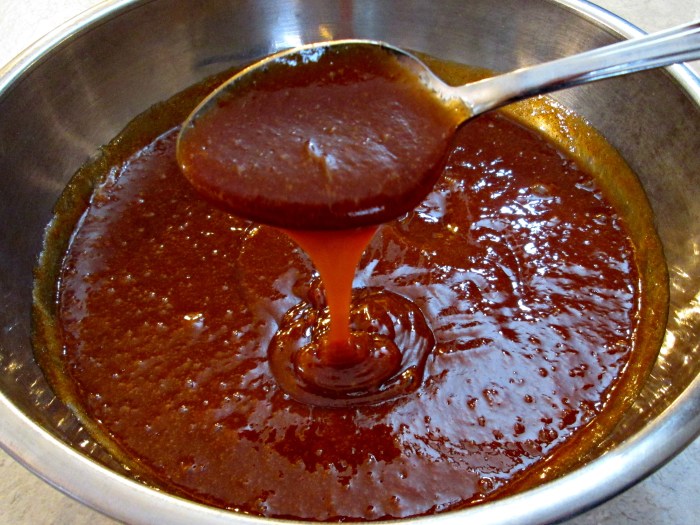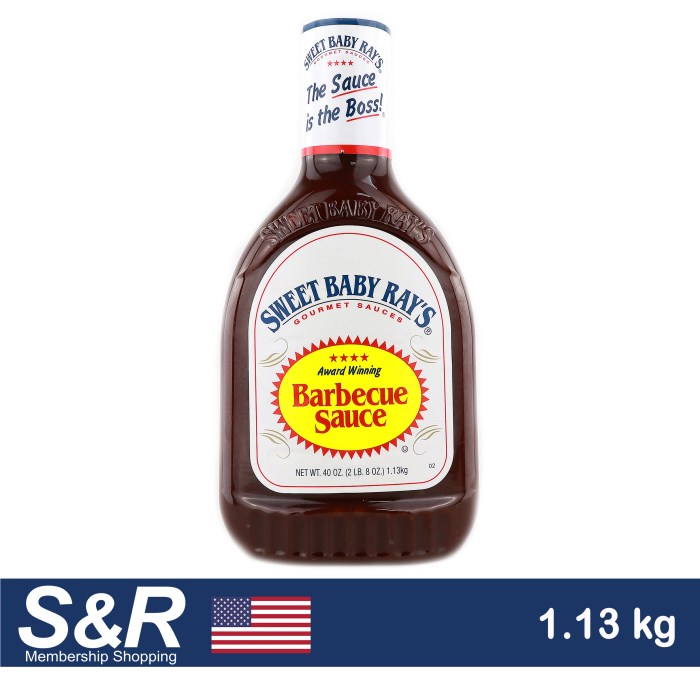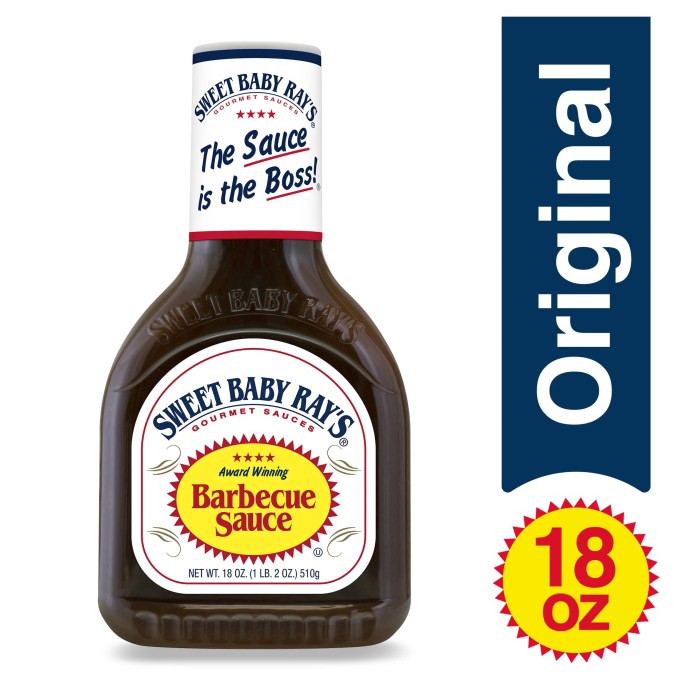The Quest for the Best BBQ Sauce: The Best Bbq Sauce Recipe

Source: poormansgourmetkitchen.com
The best bbq sauce recipe – The search for the “best” BBQ sauce is a deeply personal journey. What one person considers a perfect balance of sweet, smoky, and tangy, another might find too sweet or too spicy. This article explores the multifaceted world of BBQ sauce, delving into the key characteristics that define a highly-rated sauce, regional variations, essential ingredients, recipe development, cooking techniques, and serving suggestions.
Defining “Best” BBQ Sauce

Source: slatic.net
The concept of “best” is inherently subjective when it comes to BBQ sauce. Preferences vary widely based on individual tastes, regional traditions, and even personal experiences. However, several key characteristics consistently contribute to a highly-rated BBQ sauce. These include a well-balanced flavor profile (a harmonious blend of sweet, sour, spicy, and smoky notes), a desirable texture (smooth, thick, or slightly chunky), and the use of high-quality ingredients.
Regional variations play a significant role, with distinct styles emerging from different parts of the United States, each with its own unique flavor profile and ingredients.
| Region of Origin | Key Ingredients | Typical Flavor Profile | Sauce Consistency |
|---|---|---|---|
| North Carolina (Vinegar-Based) | Vinegar (apple cider or white vinegar), pepper, spices | Tangy, slightly sweet, peppery | Thin to medium |
| South Carolina (Mustard-Based) | Mustard, vinegar, brown sugar, spices | Savory, tangy, slightly sweet | Medium to thick |
| Kansas City (Tomato-Based) | Tomatoes, molasses, brown sugar, spices | Sweet, smoky, savory | Thick |
| Texas (Tomato-Based with variations) | Tomatoes, various spices (depending on region), vinegar, brown sugar | Sweet, smoky, spicy (can vary greatly depending on region and recipe) | Thick to very thick |
Essential Ingredients and Their Roles, The best bbq sauce recipe
The magic of BBQ sauce lies in the careful balance of its key ingredients. Each component plays a crucial role in shaping the final flavor and texture. Tomatoes provide body and sweetness, while vinegar adds tartness and acidity. Sugar balances the acidity and contributes to the overall sweetness, and spices provide complexity and depth of flavor.
Different types of vinegar significantly impact the final taste. Apple cider vinegar offers a milder, fruitier tang, while white wine vinegar provides a sharper, more acidic bite. Experimentation is key to finding your preferred balance.
Alternative ingredients can be used to customize the sauce’s flavor profile. Molasses can deepen the sweetness, while Worcestershire sauce adds umami notes. Honey or maple syrup can replace some of the sugar for a different sweetness profile. A visual representation of a well-balanced BBQ sauce would show a balanced pie chart, with roughly equal portions of sweet, sour, spicy, and smoky flavors, although the exact proportions depend on personal preference.
Recipe Development and Variations
The following recipes showcase three distinct BBQ sauce styles, each with a unique flavor profile. Adjusting the ratios of key ingredients allows for endless customization, impacting the sauce’s consistency and overall taste. A higher proportion of sugar will result in a sweeter sauce, while more vinegar will create a tangier one. Similarly, adjusting the amount of spices can alter the level of heat.
- Sweet & Smoky BBQ Sauce: Ingredients: Tomatoes, brown sugar, apple cider vinegar, smoked paprika, liquid smoke, garlic powder, onion powder. Instructions: Simmer all ingredients until thickened.
- Tangy Carolina BBQ Sauce: Ingredients: Apple cider vinegar, black pepper, cayenne pepper, brown sugar, Worcestershire sauce. Instructions: Whisk together and simmer until desired consistency is reached.
- Spicy Texas BBQ Sauce: Ingredients: Tomatoes, chipotle peppers in adobo sauce, brown sugar, cumin, chili powder, oregano, onion powder. Instructions: Blend all ingredients until smooth and simmer.
Cooking Methods and Techniques

Source: walmartimages.com
Simmering time is crucial for developing the sauce’s flavor and achieving the desired texture. Longer simmering times result in a thicker, more concentrated sauce with deeper flavors. Using a blender or food processor ensures a smooth consistency, though some prefer a slightly chunkier texture. Thickening can be achieved by adding cornstarch or flour as a slurry, or by reducing the sauce further over low heat.
Important Tip: Always taste and adjust seasonings throughout the cooking process.
Step-by-Step Guide (Example using Sweet & Smoky Sauce):
- Combine all ingredients in a saucepan.
- Bring to a simmer over medium heat.
- Reduce heat to low and simmer for at least 30 minutes, stirring occasionally.
- Taste and adjust seasonings as needed.
- Blend with an immersion blender (optional) for a smoother consistency.
Serving and Storage Suggestions
BBQ sauce is incredibly versatile. It’s perfect for basting meats during grilling, as a dipping sauce for fries or chicken wings, or as a topping for sandwiches and burgers. Leftover BBQ sauce can be stored in an airtight container in the refrigerator for up to a week. For longer storage, canning or freezing are excellent options. Properly canned BBQ sauce can last for a year or more, while frozen sauce maintains its quality for several months.
Creative uses for leftover BBQ sauce include adding it to chili, using it as a glaze for roasted vegetables, or incorporating it into a marinade for chicken or pork. Proper canning involves sterilizing jars and following a pressure canning method for safety. Freezing involves portioning the sauce into freezer-safe containers for easy use later.
Top FAQs
Can I make this BBQ sauce ahead of time?
Yes, BBQ sauce can be made ahead of time and stored in the refrigerator for up to a week. The flavors will actually deepen over time.
What’s the best type of smoker to use for BBQ?
While the sauce recipe itself isn’t dependent on a specific smoker, many prefer using wood-fired smokers for a more authentic smoky flavor. Offset smokers, pellet grills, and even charcoal grills can all be used effectively.
The best BBQ sauce recipe often involves a balance of sweet and smoky flavors. However, if you’re looking for a bolder kick, consider incorporating elements from a truly fiery sauce, like the spicy garlic wing sauce recipe ; its intense garlic and chili notes could add a surprising depth to your BBQ creation. Ultimately, the best BBQ sauce is a matter of personal preference, but experimenting with diverse flavor profiles can lead to exciting results.
Can I freeze BBQ sauce?
Yes, you can freeze BBQ sauce for longer storage. Freeze it in airtight containers or freezer bags, leaving some headspace for expansion.
What meats pair best with each BBQ sauce type?
Vinegar-based sauces complement pork well; tomato-based sauces pair nicely with beef; mustard-based sauces are delicious with chicken or turkey. However, this is just a guideline, and experimentation is encouraged.
